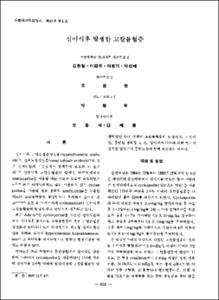KUMEL Repository
1. Journal Papers (연구논문)
1. School of Medicine (의과대학)
Dept. of Internal Medicine (내과학)
신이식후 발생한 고칼륨혈증
- Alternative Author(s)
- Park, Choal Hee; Cho, Won Hyun; Kim, Hyun Chul; Park, Sung Bae; Jeon, Dong Seok; Kim, Jae Ryong
- Journal Title
- 대한내과학회지
- ISSN
- 1226-329x
- Issued Date
- 1991
- Abstract
- Disorders of renal tubular function following renal transplantation are being recognized with increasing frequency. The incidence of hyperkalemia following renal transplantation has significantly increased in cyclosporine treated patients compared to those treated with azathioprine. The inpatient and outpatient records of 115 consecutive cyclosporine-treated patients, who underwent renal transplantation at Keimyung University Medical Center from December 1984 to December 1989, were reviewed for the development of hyperkalemia during the 3-month period immediately follow-
ing renal transplantation.
Unexplained hyperkalemia developed in 33 out of the 115 (28.7%) cycloporine-treated renal transplant recipients. The average onset of hyperkalemia was 15.4 days (range: 8—35), and the mean duration of hyperkalemia was 17.5 days. Hyperkalemia was mild-to-moderate in most case, but only 3 cases were severe (K > 6.5 mEq/L) enough to require emergency treatment.
The mean dosage of cyclosporine was 9.0 it 1.8 mg/kg, and whole blood (serum) cyclosporine levels were in the higher range 694±268ng/ml (268 + 70ng/ml). Hyperkalemia was frequently associated with hyperchloremic acidosis and normal anion gap, which is consistent with type IV renal tubular acidosis. Despite hyperkalemia, plasma aldosterone levels were in the lower normal range, and plasma renin activity levels were normal. Further studies are needed to establish the exact mechanism of hyperkalemia after renal transplantation.
—Hyun Chul Kim, et al.: Hyperkalemia Following Renal Transplantation—
Key Words: Hyperkalemia, Renal transplantation, Renal tubular acidosis
- Alternative Title
- Hyperkalemia Following Renal Transplantation
- Department
- Dept. of Internal Medicine (내과학)
Dept. of Surgery (외과학)
Dept. of Urology (비뇨의학)
Dept. of Laboratory Medicine (진단검사의학)
- Publisher
- School of Medicine
- Citation
- 김현철 et al. (1991). 신이식후 발생한 고칼륨혈증. 대한내과학회지, 40(5), 653–660.
- Type
- Article
- ISSN
- 1226-329x
- 파일 목록
-
-
Download
 oak-bbb-00727.pdf
기타 데이터 / 545.08 kB / Adobe PDF
oak-bbb-00727.pdf
기타 데이터 / 545.08 kB / Adobe PDF
-
Items in Repository are protected by copyright, with all rights reserved, unless otherwise indicated.